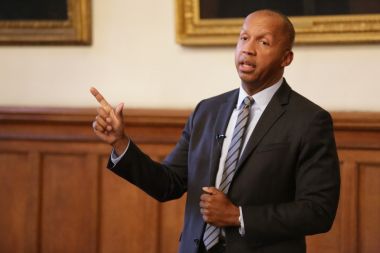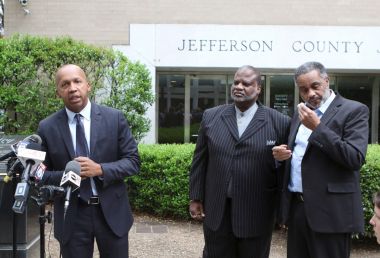Bryan Stevenson: Four steps to really change the world

How do you change the world? It's the question that troubles anyone who looks at the state of the culture around us and sees the many deep injustices within it. Idealists still believe it's possible; the more weather-beaten tend to concede that the system is fixed to prevent true change. While most of us want to sit in the former camp, in our darker moments we can tend to gravitate toward the latter. Last night I heard a man who believes so strongly that we can change even the worst parts of our world for the better, he convinced a room full of people to re-embrace their idealism again.
Bryan Stevenson is an extraordinary man. As the founder and Executive Director of the Equal Justice Initiative based in Montgomery, Alabama, he has gained global acclaim for his work challenging injustice in the American legal system. A close advisor to President Obama, he has successfully campaigned for changes in the law around the trial and incarceration of minors, and has represented dozens of death row prisoners, many of whom had been wrongly imprisoned and faced death without Stevenson's intervention. One of his clients, Anthony Ray Hinton, had been on death row for nearly 30 years for a crime he did not commit; Stevenson worked on his case for 15 years before seeing him exonerated this April. So this man knows a thing or two about fighting injustice, and just how much it takes to see real change happen.

Stevenson was at Lambeth Palace at the invitation of the Archbishop of Canterbury, and addressed a room mainly filled with high-ranking representatives of the British legal system. He spoke with astonishing eloquence on the topic 'How do you change the world?', outlining the practical steps which he believes take us on the journey toward real change in our communities and society. Throughout the 45-minute address, he referred frequently to his own Christian faith, and to his belief that the church has a particular imperative to get involved in issues of injustice in the world.
Great to welcome @eji_org's Bryan Stevenson to Lambeth Palace. Inspiring talk of justice, mercy and reconciliation. pic.twitter.com/iwGHda3NAq
— Justin Welby ن (@JustinWelby) July 15, 2015Speaking (without hesitation, or notes) from his experience working among prisoners on death row in the American South, he presented four ideas which he said could be applied more widely to the other social and cultural problems which we face together.
1. We have to get approximate to the problems we care about.
Stevenson's first point was that we can't solve the world's problems at a distance. We have to get up close to the people we want to help, because that 'proximity' helps us to truly understand them, their problems and the possible solutions. He told a moving story about the experience of meeting his first death row prisoner while still at law school, and how looking a condemned man in the eyes while witnessing the shocking treatment of his guards became formative in his career. He went on to explain that when he looks at the Gospels, he sees this same proximity in Jesus' life, as he moved among and got up close with the most broken people in his society. "To me, the Great Commission is a call to get approximate," Stevenson said.
2. We have to change the narrative.
Next, Stevenson explained his belief that US culture is based on "a narrative of fear and anger". He gave the example of the demonisation of young people; the formation in American psychology of the idea that some children aren't children, but are in fact 'super-predators', which paved the way for children to be tried as adults – many of them getting life sentences without parole. He spoke too of a flawed narrative on race, where because "American doesn't do shame well", the culture is attempting to suggest that slavery is a thing of the past when "really it has evolved" into a legacy of racial inequality. Stevenson said that to achieve real change, we need to identify and challenge some of the stories that our culture tries to tell.
3. We have to remain hopeful.
In perhaps the most moving part of the lecture, Stevenson talked candidly about some of his experiences fighting for condemned men, sometimes not always successfully. While he has felt battered and bruised by some of these cases, he has identified hope – driven and enabled by faith – as the key ingredient in fighting injustice for the long-term. Stevenson's team of 50 all have to figuratively 'sign up' to a statement of hope in order to be employed by him, "to work for me, you have to be able to believe what you have not seen", he said, referencing the famous passage in the book of Hebrews. Stevenson was electric on this subject, slipping into the mode of a master preacher: "Hope is what will make you stand when everyone else is sitting," he proclaimed, "hope is what will make you speak when everyone else is silent."
4. Sometimes we have to do uncomfortable things.
Finally, Stevenson outlined a commitment to discomfort as being vital to achieving real and lasting change. He spoke about facing down a humiliating strip search from a racist guard in order to see a client with severe learning disabilities, but referred to the trials faced by some of the "giants" on whose shoulders he stands, people like Martin Luther King and the leaders of the Civil Rights Movement, and reflected that he feels comparatively "privileged" not to have to face a similar level of oppression. Although he didn't talk specifically about Jesus' command to "take up [your] cross and follow me", the notion of sharing in Jesus' sufferings loomed large at this point. The pursuit of justice isn't easy, it's uncomfortable.
Stevenson concluded by talking even more personally about his work, and the biblically-backed motivations that drive him. "I believe people are more than the worst thing they've ever done," he said, explaining that the gospel idea of redemption is bigger than the legal system's idea of justice. "I believe the opposite of poverty is not wealth, but justice," he said, lamenting that in America, you're better off if you're guilty and rich than if you're innocent and poor.
The lecture and the man who gave it were both profoundly challenging. He's found a way of embodying hope – to his team and organisation, and to the many condemned men who had previously believed that their lives were irredeemable. In closing, Stevenson talked about how he came to a realisation of why he'd given his life to trying to fight injustice. "I realised that I do what I do because I'm broken," he said. "And these are my people – the community of the broken." While we might not possess some of Stevenson's gifts, that's a statement with which we can all identify. Today I woke with a renewed motivation to join him. Can we really change the world? Bryan Stevenson believes we can; after hearing him speak, I'm inclined to hope so too.
Martin Saunders is a Contributing Editor for Christian Today and the Deputy CEO of Youthscape.
Bryan Stevenson's TED talk, 'We need to talk about an injustice' is one of the conference's most-viewed videos of all time. Watch it below.











